Intermountain Cancer Center locations provide you with the resources, tools, and information to help you learn about your treatment options and services. Your physician and care team will discuss your own personalized care plan with you. Remember that your input, preferences, and opinions are critical to the decisions made about your care plan and it’s important that you openly communicate what is most important to you.
Cancer Support Services
Managing cancer, as with any life-threatening disease, can be physically, emotionally, and spiritually challenging for you and your loved ones. Intermountain Cancer Center locations offer many supportive therapies and services to provide comfort and care from the moment your cancer is diagnosed throughout treatment and survivorship.
A Care Team Centered Around You
Caregiver
Your Caregiver plays a key role in your journey.
A family member, friend, or paid helper who is responsible for physical and emotional support throughout the cancer care process.
Dietitian
Your Dietitian plays a key role in your journey.
As part of the cancer care team, a Registered Dietitian provides medical nutrition therapy for patients during all phases of treatment. Dietitians help patients by identifying nutritional impacts, prescribing nutrition interventions, providing education and monitoring nutritional status. Talk to your provider about setting up an appointment with a dietitian.
Financial Advocate
Your Financial Advocate plays a key role in your journey.
Financial advocates often help patients understand their out of pocket expenses and what their health insurance plans may cover. Financial advocates may also help patients set up payment plans, find cost saving methods for treatment and improve access to health care services the patient.
Genetic Counselor
Your Genetic Counselor plays a key role in your journey.
If cancer seems to run in your family you may have an increased risk of cancer. Genetic counselors can help determine if there is a genetic reason for the occurrence of cancer in a family. They can discuss the benefits and limitations of seeking genetic testing.
Nurse Navigator
Your Nurse Navigator plays a key role in your journey.
Our nurse navigators help with disease and treatment education, coordinating your care, and general problem-solving. Their goal is to provide the best care possible to patients and families throughout their cancer journey.
Provider
Your Provider plays a key role in your journey.
A person qualified to practice medicine who is responsible for diagnosing your symptoms, designing and managing your treatment plan, and providing counsel throughout the cancer care process.
Social Worker
Your Social Worker plays a key role in your journey.
Social Workers can help you cope with cancer and support you as you deal with the psychological and social concerns you face through diagnosis, treatment and remission.
Treatment Nurse
Your Treatment Nurse plays a key role in your journey.
A treatment nurse gives instructions during treatment and can help you handle concerns about treatment therapies and any possible side effects.


